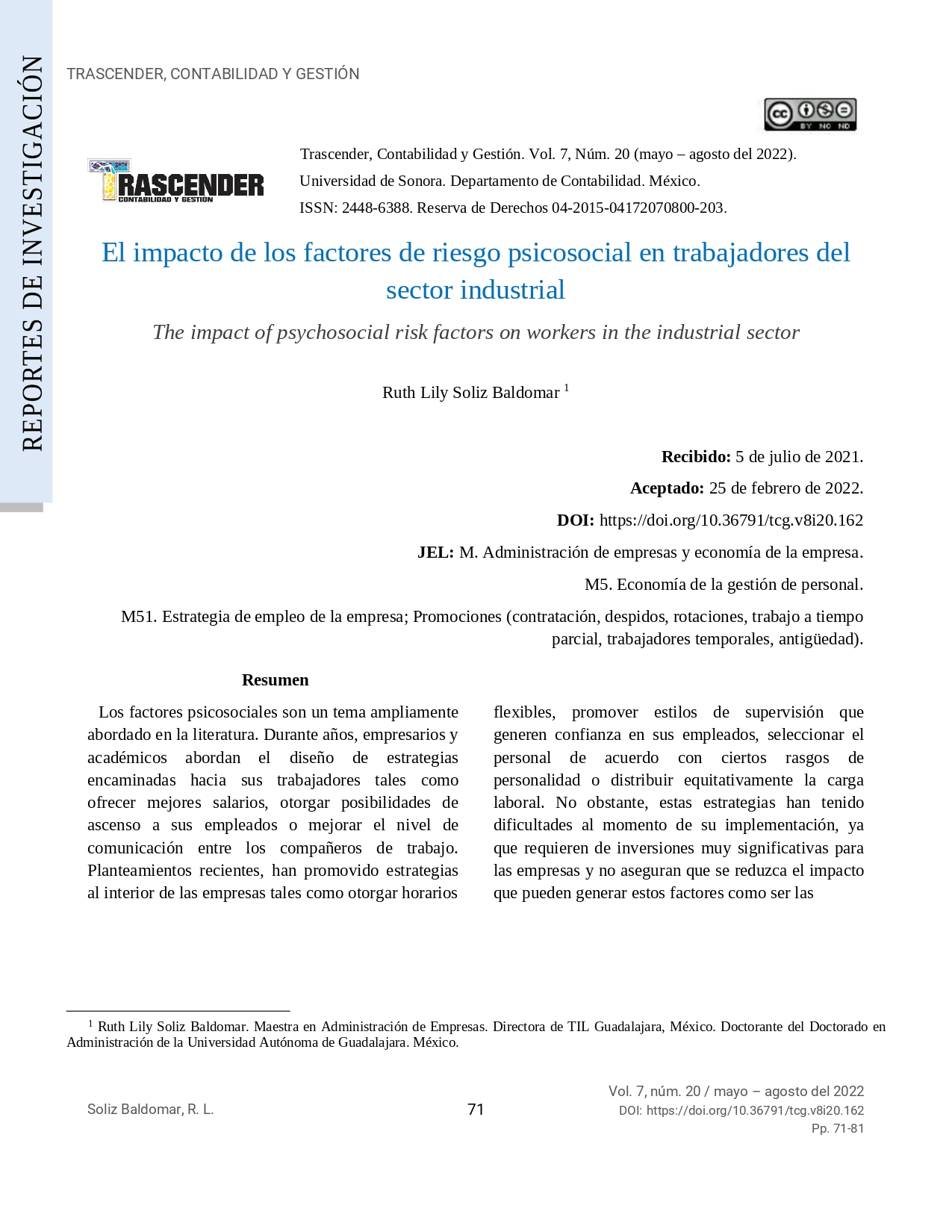The impact of psychosocial risk factors on workers in the industrial sector
DOI:
https://doi.org/10.36791/tcg.v8i20.162Keywords:
Psychosocial risk, job, work stressAbstract
Psychosocial factors are a topic widely discussed in
the literature. For years, businessmen and academics
have tackled the design of strategies aimed at their
workers, such as offering better salaries, giving their
employees promotion opportunities or improving the
level of communication between co-workers. Recent approaches have promoted strategies within companies such as granting flexible hours, promoting supervision styles that generate confidence in their employees, selecting personnel according to certain personality traits or equitably distributing the workload. However, these strategies have had difficulties at the time of their implementation, since they require very significant investments for companies and do not ensure that the impact that these factors can generate, such as
absences, abandonment, work stress, mental health is reduced, among others. In this sense, the present research aims to investigate the impact of factors not commonly studied, such as intra- and extra occupational psychosocial factors and their incidence in operating workers of companies in the industrial sector in the industrial zone of Guadalajara, Jalisco.
Through the literary review, some intra and extraoccupational psychosocial risk factors were analyzed, these being the most relevant for the authors mentioned throughout this research. The field study carried out is descriptive, transactional, with a non-experimental design. The methodological process consisted of the identification of theoretical pillars. And the census was defined to apply the techniques and selected instrument made up of 227 workers from the industrial sector in the city of Guadalajara, Jalisco. The information collected is systematized and the extra-occupational psychosocial risk factors are identified, as well as the occupational, sociodemographic and mental health information.
Downloads
References
Aguilera, A. (2012). Crecimiento empresarial, basado en la responsabilidad social corporativa. Scielo, 1(26), 1-26.
http://www.scielo.org.co/pdf/pege/n32/n32a02.pdf
Ansoleaga Moreno, E., y Toro, J. P. (2010). Factores psicosociales laborales asociados a riesgo de sintomatología depresiva en trabajadores de una empresa minera. Salud de los Trabajadores, 18(1), 7-16.
Charria, O, Víctor, H., Sarsosa, P, Kewy, V., y Arenas O, F. (2011). Factores de riesgo psicosocial laboral: métodos e instrumentos de evaluación. Revista Facultad Nacional de Salud Pública, 29(4),380-391. ISSN: 0120-386X.
https://www.redalyc.org/articulo.oa?id=12021522004
Gómez, C., y Rodríguez, N. (1997). Factores de riesgo asociados al síndrome depresivo en la población colombiana. Rev.
Col. Psiquiatría, 26(1), 23-35.
Gunnar, M., y Quevedo, K. (2007). La neurobiología del estrés y el desarrollo. año Rev. Psicol., 58, 145-173. DOI: https://doi.org/10.1146/annurev.psych.58.110405.085605
Hernández, P., Soria, M., y Silla, J. (2003). El Estrés Laboral: ¿Un Concepto Cajón-De-Sastre? Revista Relaciones Laborales,
(11), 167-185.
Londoño, N. H., Juárez, F., Palacio, J., Muñiz, O., Agudelo, D., Marín, C. A., Lemos, M., Toro, B. E., Ochoa, N. L., Hurtado, M.
H., Escobar, B., Herrón, I., Gómez, I., Uribe, A. F., Rojas, A. L., Pinilla, M. L., Villa-Roel, D., Villegas, M. J., Arango, A. L.,
Restrepo, P. A., y López, I. C. (2010). Factores de riesgos psicosociales y ambientales asociados a trastornos mentales. Suma psicológica, 17(1), 59-68.
Luque, P., Gómez, T., y Cruces, S. (2000). El trabajo: fenómeno psicosocial. Guillen, C. (Ed.), Psicología del trabajo para relaciones laborales. España: McGraw Hill.
Ministerio de la Protección Social y Pontificia Universidad Javeriana Bogotá. (2010). Batería de instrumentos para la evaluación de factores de riesgo psico-social. Bogotá: Ministerio de la Protección Social.
OIT-OMS. (1984). Organización Internacional del Trabajo-Organización Mundial de la Salud. Factores psicosociales en el
trabajo: naturaleza, incidencia y prevención. Informe del comité mixto OIT/OMS sobre medicina del trabajo. Ginebra: OIT,
http://biblioteca.uces.edu.ar/MEDIA/EDOCS/FACTORES_Texto.pdf
Organización Mundial de la Salud. (2013). Un estado de bienestar.
http://www.who.int/features/factfiles/mental_health/es/
Ruiz, A. (1987). Salud ocupacional y productividad. México, D.F.: Editorial Limusa.
Sánchez, O. (2009). Factores intra y extralaborales de los y las trabajadoras de una empresa pública de Costa Rica. Revista Enfermería Actual de Costa Rica, 17, 1-9.
Sánchez, O. (2010). Factores intra y extralaborales de los y las trabajadoras de una empresa pública de Costa
Rica. Rev. Enfermería Actual en Costa Rica, 17, 1-9.
Sotillo, R. (2000). Estrés en Emergencias Sanitaria. Recurso electrónico disponible en: www.capitalemocional.com
Villegas, J., y Santamaría, E. (1999). Evaluación del nivel de Burnout en una muestra de trabajadores del área de tratamiento de un Centro Penitenciario. Revista Española de Sanidad Penitenciaria, 1(3), 68-70
Weir, K. (2013). Work, stress and health, 10th International Conference on Occupational Stress and health in Los Angeles by the American Psychological Association (APA). http://www.apa.org/monitor/2013/09/stresshealth.asp

Downloads
Published
How to Cite
Issue
Section
License
Copyright (c) 2022 Ruth Lily Soliz Baldomar

This work is licensed under a Creative Commons Attribution-NonCommercial-NoDerivatives 4.0 International License.
La Revista Trascender, Contabilidad y Gestión se compromete a asegurar la confidencialidad y privacidad dela información personal que se capture en éste sistema de conformidad con los lienamientos editoriales de la Universidad de Sonora
La información será utilizada únicamente para fines editoriales, académicos y de investigación, notificándose de forma directa al usuario registrado en el sistema, con el alcance que el usuario establezca al momento de su registro.

























